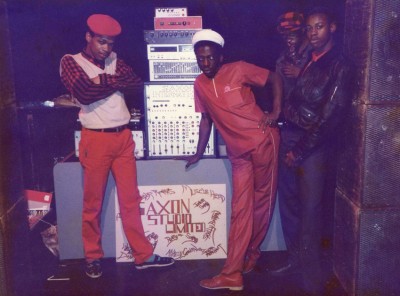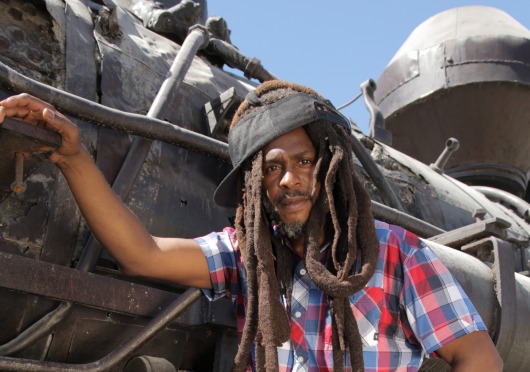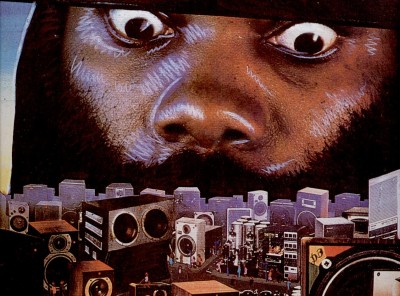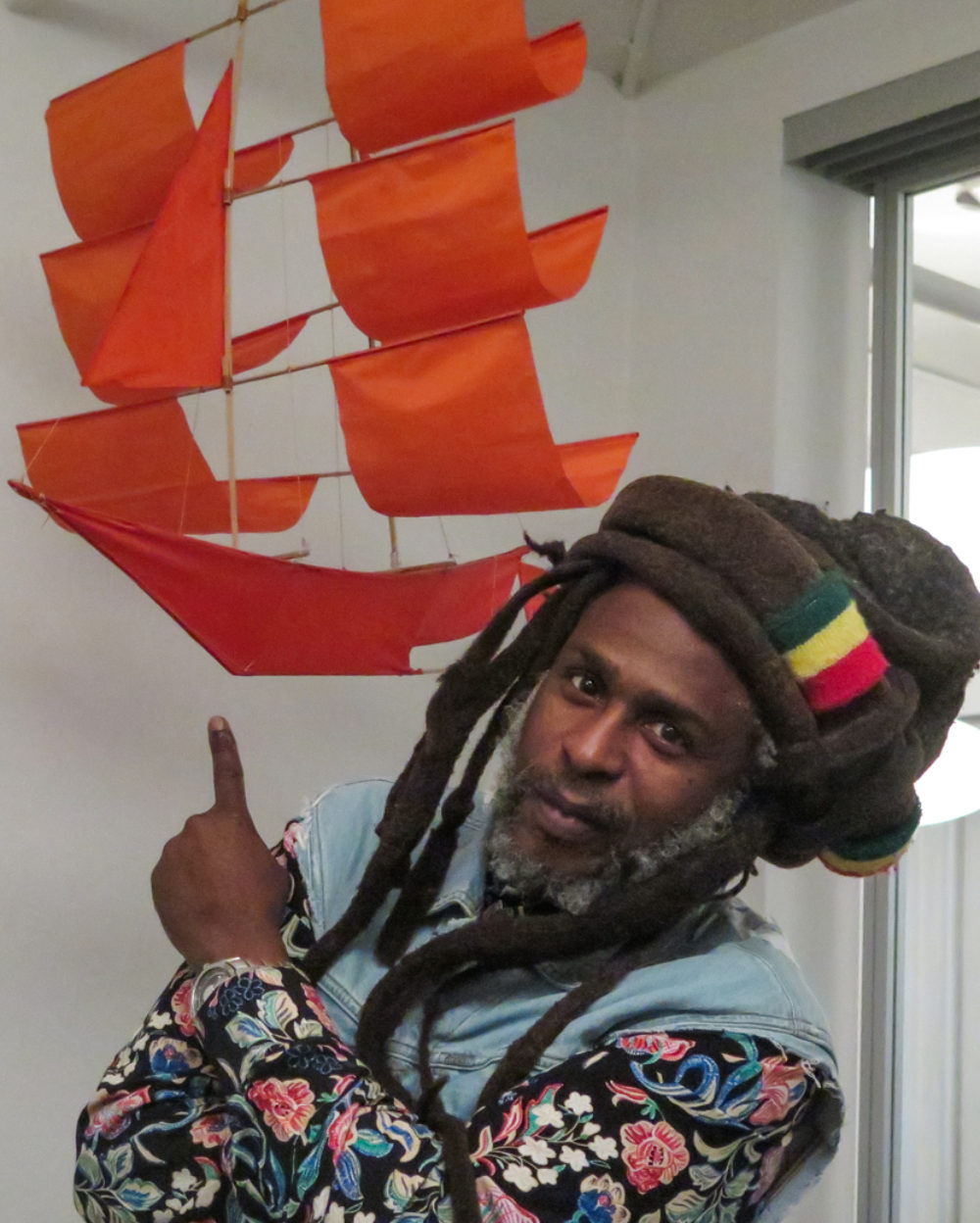
David Hinds is a founder of the formidable U.K. reggae band, Steel Pulse, formed in 1978. It’s been 15 years since the band released a new album, but now the silence is broken with Mass Manipulation (Rootfire/Wiseman). Afropop’s Banning Eyre sat down with Hinds in New York recently to talk about the album, the band, and the state of reggae today. Here’s their conversation.
Banning: This is your first album in 15 years. What's been going on all those years, and what finally got you back in the studio?
David Hinds: Several reasons. But the main reason was not being affiliated with a major record label anymore, by choice. Not having that kind of affiliation also meant lack of finances to do an album which would be on the caliber of the albums that we had done previously. Another major setback was that the studio where we recorded our previous albums, albums like Rage and Fury and African Holocaust, was no longer accessible to us because the building lease ran out and the owners had no consideration; they didn't give us an inkling as far as us purchasing it from them to continue our business. So we had to vacate the premises, and that's been the major reason why we were unable to have a series of albums like we normally did in the past.
But you have kept performing during those years.
We had to. Because that’s the only way we generate the money. You don't make money selling albums when it comes to reggae music. It's strictly live performances. And we also rely on the sales of the vinyls and CDs at the concerts. It's a little bit of ready cash.
Has that always been true?
I think it's always been true. When it comes to Steel Pulse, our first three or four albums, we didn't see any revenues. By the time the record labels pimp you, as far as the royalties, the packaging of the album, the publishing, copyrights, the studio time that they've sort of jacked up. You know, they use this in-house studio facility for the most part, and you're doing it, and all of a sudden you see this huge bill in the fine print, and the cash never really left the bank in the first place.
So with all of that in mind, that was never really any money to be made. This is why an icon like Marley was really the only reggae artist who saw where his energy went. If you mention a guy like Shaggy—we’re talking about roots reggae music here—I don't see cats like Shaggy fitting into that category, so to speak. It's not the hard-core roots, spiritual reggae as we know it. So when it comes to that caliber of music, no, it couldn’t make any money then, and it hardly makes any money now.
You guys stick to that classic roots sound. Do you find the audience has changed? In the years you've been operating, we’ve seen dub, dancehall, and all these other spinoff sounds. They're essentially reggae, but they don't have that same spirit of the roots sound that your music does. Has the audience changed?
It all depends which side of the fence you're looking at. Let's put it this way. If you used to get oranges that have a particular taste, and someone says there's no more oranges, but we've got satsumas, tangerines and clementines and what have you. After a while, you get acclimatized, and that's the closest thing to it, but it's not the orange you’ve been used to. I think that's what has happened with reggae music. It started out where everybody was introducing the music through roots and spiritual aspects and politics that were inside the music.
That's no longer there, but the beat is still carried on by your dancehall artists and those who mimic the sound, and people got accustomed to that. That's the way it's going to be, and they started accepting it. But then, having said that, you've got diehard people that have never really embraced the dancehall. That's one of the reasons why I think the music has not continued in the way it should have. Because people weren't getting what they were used to. And it speaks for itself. Like I said, Marley has been the only one who really made any money out of this, and the reasons have been because when he came to the world, he had that ideology in the music itself, and the world was ready. It was timing. The climate was there. You couldn't have found any more perfectly matched situation. And where are we today?
But I'm hoping that this album will help turn people around and start realizing that there's hope within the music for what we've got to offer, and the style that they were used to when they were introduced to reggae in the first place. And the youths? We've got to bear in mind that the youths now, and the whole music industry, have changed. You know in my upbringing, music was always on vinyl. And the youths now, they don't even know what a cassette machine looks like. It's all compressed, MP3, or something from a USB stick. And it has a trashy sound. But they're accustomed to hearing that trashy sound, and I just say, "That sounds awful." But they don't know any different.
But you find that a small percentage, once they start hearing in its undiluted format, they start to go in the direction of the original source of that format. Like I said, it all depends on what side of the fence you're looking to analyze how reggae has progressed or digressed or regressed over the years.
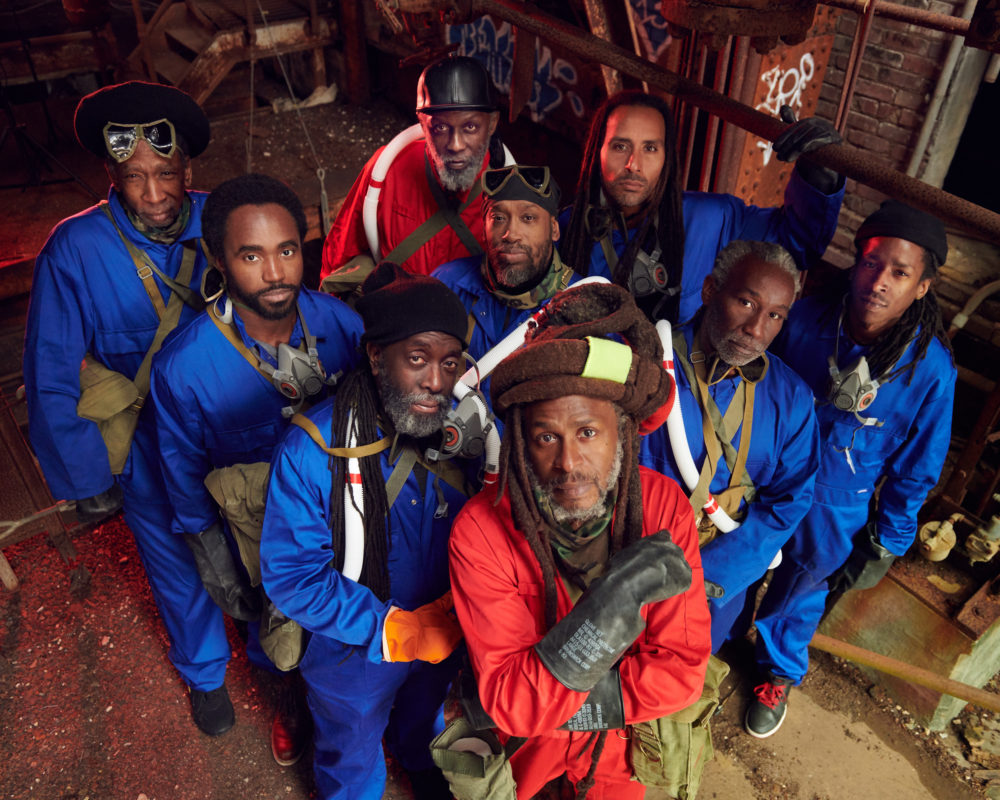
Well, a lot of young people are getting into vinyl again these days. Vinyl is having a real comeback. It's like what you're saying about reggae itself. People either forgot or they just got distance from the original quality of sound. So when they hear it, it's either discovery or it's a reminder of something they'd forgotten.
Now, CDs were sold to us in the mid-'80s, and as far as I'm concerned, in retrospect, it was one big trick. The packaging played a big part in how our percentages were dispersed. All of a sudden the CD becomes the order of the day. The percentages remained the same, but you were given the impression that it was costing them more for a CD to be printed, and hence the reason why a CD was always more money than vinyl. So when the CD is first came out, they were sold for about 12 or 13 bucks, while vinyl was still going for eight or nine bucks. What was selling it was that it had a better quality. It was cleaner. And you know, back in the day, when you play the vinyl for a long time, you didn't take care of it, and even if you did, there were pops and crackles and all that from dust in the grooves.
Then all of a sudden you were sold this big lie about having a cleaner sound. But reggae suffered immensely once it came to the CD, because we relied on the grooves of the vinyl to complement the bottom end. And everybody knows that reggae music needs that. Then we were told that CDs were costing more money to package, that's the reason why you still got the same percentage, and we come to find out after some years that the vinyl actually was more expensive to print up than a CD.
To be honest, no disrespect, when the record label started to take a dive as far as sales, and they started to fold up, I was happy for that. Because they were just one great entity, an industry that had been ripping off artists like us that had been slaving over the music for decades.
So you're producing albums yourself now.
Yes. We've sort of teamed up with a company called Rootfire Cooperative. Obviously it's a much smaller label than the major labels that you’ve been accustomed to. But they seem to be working more in our direction, and are more than what we've been looking for in terms of an artist/label relationship.
We weighed the situation up. We thought it was some kind of trick at first, because they all want a piece of something from you—an arm and a leg or a bollock, pardon my Spanish. And then these guys come along and say, "We just want to invest in your product, and you pay us back whatever you can as long as the products selling. If you don't sell one damn copy, you're not getting your money back." So there's no stipulations or clauses that say after so many years if you don't generate this amount of money, the percentage kicks in and you always say, B, C and D. It's nothing like that. We kept saying there's got to be a catch. Hang on. But after careful thinking researching and double checking, it was just some guys seeing that the playing field was not level, the goalpost was always moved, and the industry had been defending itself against acts like us in the first place.
Of course, the game is so different now. Promotion is a whole new thing with social media and YouTube and so on. This is why so many artists are saying to hell with labels and going on their own.
Right. So when I say two cats like Rootfire in the social media that it made a big difference in our lives, I just keep kicking myself in saying, “Where were you guys 30 years ago what we needed you?" There's a saying that says it's better late than never. So we are now what I call the final semester of our career. And we really want to make the most of it. With all the experiences that we've had, both good and bad, I think were able to salvage and turn things around before putting up our guitars and microphones to make room for the next set of champions ahead.
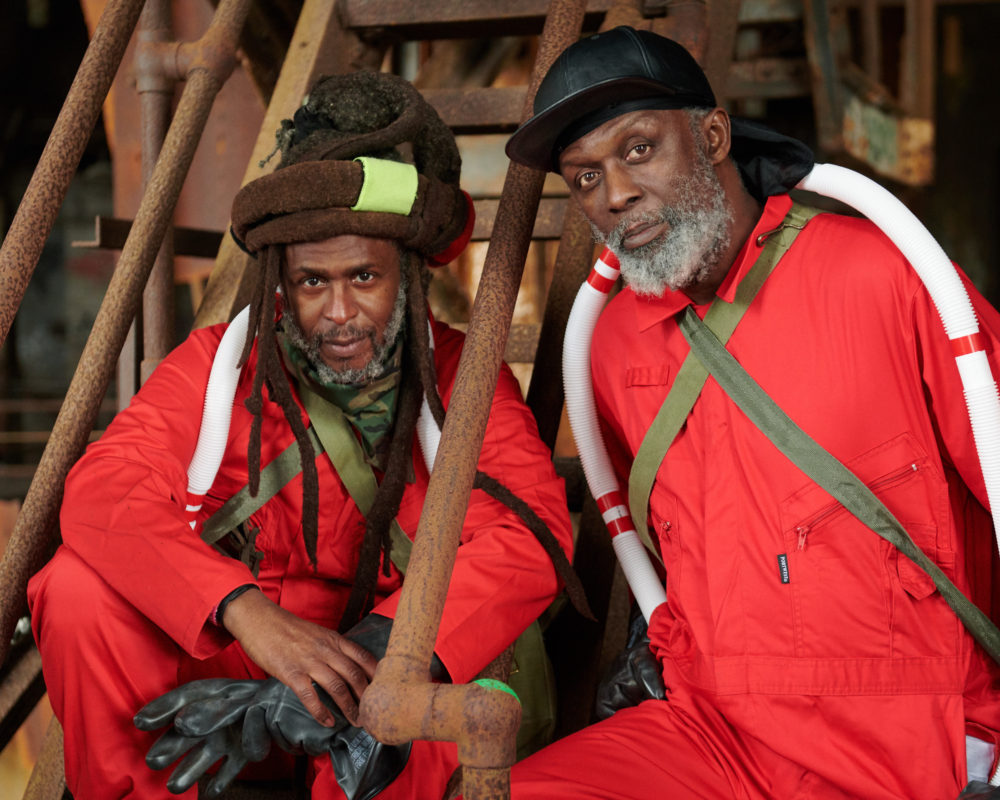
Well, you guys are certainly champions of your era. Let's talk about the record. After 15 years, was there an overriding objective or concept?
What I can say is, the longer it takes us to put an album out, the more apprehensive I become. Because it's almost as if we’re fading away, so to speak. We weren't the conversational piece in everybody's lives in the domain of reggae. So there was a great concern about not being in the limelight for such a long time, that we'd lost a lot of footings and grounds that we actually covered yesteryear. So that was the main worry about having something out after such a long time. The other worry was that once it came out, it would not be accepted, that it would've missed its sell-by date. “Hang on, these guys are a bit old hat trying to do this style of music. The tempo. The chords they're using. The melodies they’re using. The instrumentation. The arrangements.” We thought we might have missed the boat.
As time went by, we realized that our songs-- especially in this world of Trumponomics that we’re in now-- that the concepts behind the album are actually predominant, and more of a concern than I had realized. What we have to say is still relevant. And along with the compliments from the youths we have among us who said, "Oh no, man, this is nice." My daughter is 21 years old, and my other daughter is 20. My son is much younger than that, and they are all nodding their heads with signs of approval. So I said, "Yeah, all right then. Let's go along with that. Here you are. Mass Manipulation at your doorstep!”
I notice a number of the tracks were recorded in different places. Talk about the evolution of Mass Manipulation.
Well, there were about 30 songs put down, not to mention songs that were just ideas that never got to the recording studio. I can throw in another 10 like that. It was done over a number of years, and during that period of time, we had to monitor things according what was going on politically, what was going on in terms of how tempos were dropping on the turntables, social media, radio stations and all that. We had to keep monitoring to see if the music would be worth its weight in gold.
We used different studios. It wasn't easy. Because we didn't want the sounds to be too diverse. We wanted each song to have its own character, but we didn't want to be so far removed that you would hear the studio. So it was the case of monitoring how we recorded things and the type of energy we wanted to apply to these tracks while we were moving around. Because, you know, we do a recording after being on tour for three weeks. So you come into a studio with a bunch of guys who are tired and the tracks don’t have a tight sound. It's not fresh. So if it's not spontaneous, we do it again, until it's right. And we always had to keep on point the methods of how we recorded when we did Handsworth Revolution [1978], Tribute to the Martyrs [1979], the Caught You album [1980], True Democracy [1982] and Earth Crisis [1984].
It was all about the band going in as a band and recording to get that vibe. And the one with the best vibe, we take that and double track it, overdub it, and whatever we needed to do to build the tracks up like we used to do in yesteryear.
So you record with everybody together.
Yes. That's right.
You mentioned tempos. Do you find that tempos are getting faster?
Well, that's a very good question. Let's take American music for example. I don't think any other style of music recognized tempo as much as the Americans did when they made r&b and rock 'n' roll. That's one of the reasons that formatting music for radio play, and videos and all that kind of stuck. The songs all had a similarity of tempo. Because that's the way Americans categorize the music. But over the years, Jamaicans tried to sit down and rationalize why the music was not that acceptable as it could be. Marley, for example, I think Americans when they first heard it thought that his tracks were too slow. [Sings backing and chorus for “Chase Those Crazy Baldheads.”]
And I think over the years guys like Sly and Robbie kicked in, and realized that if they changed the tempo of the songs, that it would be more palatable for the American audience. Now I think it's reached a place where there are so many diverse styles of music across the world that have so many different tempos, there came a time when it never really mattered anymore as far as the tempos. We had a producer, a coproducer with the album, Sidney Mills. I often said to him, “Do you think this track needs to be any faster?" And he’d say, "No, man. It's all right.” And I'm listening to it while I'm all geared up, and I'm thinking this really sounds slow. I wouldn't take his word for it. So then I put the track down and I go away from it and come back several weeks later, and I listen to it. If my spirit tells me that it's too slow, then I am going to back and rerecord it. But nine times out of 10, I come back and listen to the track and the tempo is O.K. So his flipside of trying to have it work both ways was, “Well, you do know, if it does come out slow, you can guarantee that the DJs will be speeding it up on the turntable when the time comes.’
And so I said, "You know what? Let's let them do it. Let's leave it alone. That's the energy and the vibe that I had at that time. Let's roll." So I have realized over the years, in this modern day, tempo doesn't matter as much as it used to.
Tempo is a big part of the history, isn't it? Ska evolved into rocksteady, and into reggae, that was all basically a process of slowing down. But it was when we got to that slow speed that reggae really hit internationally. Somehow people were just ready for that. That slowness had the special power.
The slow, yeah. But later, guys like Sly and Robbie, they saw the necessity of trying to keep the music alive. So it was all about changing the accent, all about emphasizing the accent on a different beat, changing the sound of the snare, where we had the rimshot, what you call a side stick. And then instead of using a rimshot, they would use the belly of the snare. [Sings rhythm] and they start putting the kick in where it had been missing before. And they started to fill that gap to help you sort of nod your head to a quicker tempo. And they slowly brought it up, and all of a sudden you've got dancehall, and you've got guys like Black Uhuru.
But the one that really changed things for me, in terms of the way reggae music was developing was Shabba Ranks. When I saw black Americans on the street talking about Shabba Ranks, I knew that reggae was going to come and stay now. And before you know it, they all started doing raggamuffin in their groups. New Edition guys. So I realized that the music was starting to have that swing to it where the Americans could relate to it. It was hard work. And it was all about studying and truing to keep the music in play. Because, after Marley passed away, it was slowly dying a death.
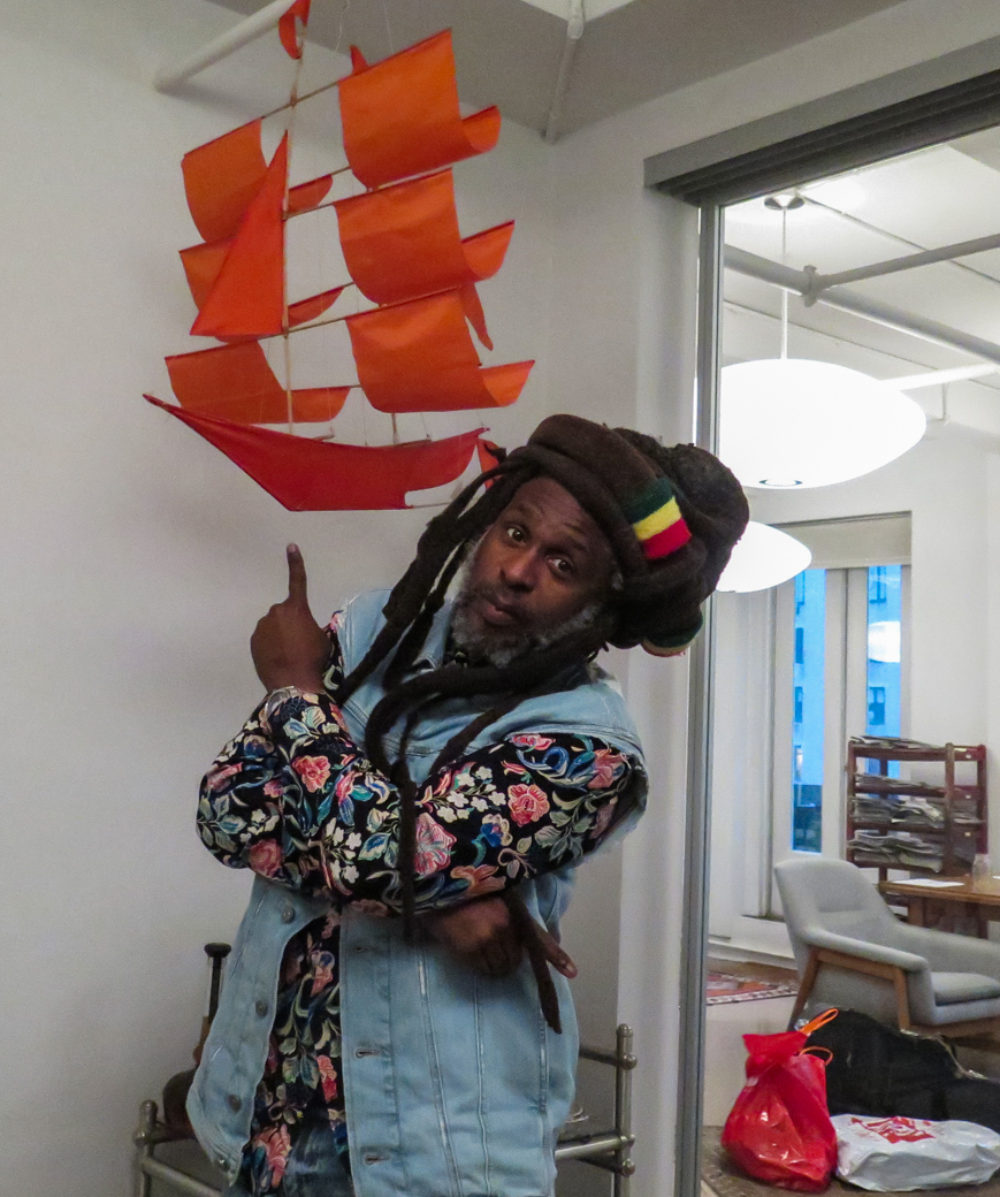
There was that interesting moment after Marley died, when the ska sound came back, especially in your part of the world--U.K. ska sound, the Two Tones. That made a big impression.
Yeah. The U.K. ska bands. But what was even more interesting were bands like The Untouchables that were around at the time, Fishbone, even Gwen Stefani—they all evolved out of that and made their millions of dollars. And we’re looking at this and saying, "What the hell's going on? We've been there. We've done that." You know. Prince Buster. Derrick Morgan. All these guys. We have been there and done that. We've worn the T-shirt, so why is this a revolution? And we started to recognize that a lot of the white acts were engaging in the music, and we’re saying, "But we've already done all that. Why should we go there?"
And before you know it, there was a revolution in England, and bands like us were going to be out of work. And that's why we went towards Europe. Thank God that France and Holland in particular didn't gravitate to that kind of sound. They said, "Hell no. We want to keep the reggae music that we've grown to love." And they kept us alive as an industry. And then we sorted out the United States, who had never seen the Steel Pulse experience before. And the rest is history. Out came True Democracy. Out came Earth Crisis. And the band became the best thing since the invention of the wheel.
I remember. It was very exciting. What about African reggae bands? Have you followed them at all?
Well, that's a very good question there, Banning. When reggae was introduced to Africa, it was off the tempos that we, Third World, the Abyssinians, Wailers, Burning Spear, Culture were using, and also the spirituality and the melodies and the concept within the music. That was what they recognized as the music format. So when they started to get involved, they based it on the traditional reggae that we've grown to love. So we have Lucky Dube, who passed away-- well, he was actually brutally murdered about 12 years ago.
Lucky Dube was huge. Such a giant star. And his style, with that organ sound, you still hear that in so much African pop music today.
Well, Lucky Dube, and no disrespect, but he was a spinoff of what Peter Tosh was all about. Southern Africa always loved Peter Tosh. And Lucky Dube's music became a voice for those who were under the oppression of the apartheid regime. It was political songs. And it was just a matter of course that they would gravitate towards reggae, and even more so when one of their own was doing it, which was Lucky Dube. So that got established. And then you had West Africa with Alpha Blondy, and they too picked up from the traditional reggae music. As far as East Africa, you've got Teddy Afro. You see, when reggae music was introduced to the world, it was based on the spirituality and also the political aspects in the lyrics, as well as the grooves that came behind it. Because when you think about it, it's music that you really have to penetrate. It's food for the brain. And you have to digest it. So not all the songs that are going to be political can really come out with a fast tempo. It had to be meaningful, and a lot of times that one-drop groove sent the message home. That's how the Africans heard it. Obviously over the years, dancehall slowly crept in, but mark my words, the traditional reggae one-drop is still the flavor of the day in Africa. So there you go.
It seems like every African country I go to has a local reggae star, at least one. You just named some of the big ones. There's also Tiken Jah Fakoly.
Right.
It's funny, you know, because, African pop music is changing so decisively these days, especially with this wave of new stuff coming out of Nigeria and elsewhere. Afrobeats. It's very polished, but rather superficial a lot of the time. It sounds great, but it doesn't feel as deep as the stuff we got into all this years ago.
Yeah, what are some of those bands? P Square, 2face…
And now we have Wizkid, Davido, Yemi Alade...
I listen periodically to that style of music, because the youngsters as you know, like it. And also, I'm hanging around a lot in the French Caribbean that is more conducive to that kind of music than the British Caribbean. Martinique, Guadeloupe, and sometimes St. Martin. And they're all accustomed to that style of music that's coming out of Africa. Afropop you call it?
Well, nowadays they're calling it Afrobeats with an “s.” But I bet in those islands you hear a lot of zouk and kizomba. Maybe Cape Verdean music.
Right. And if you listen to what's going on with those guys in West Africa, Nigeria in particular, it's a sped-up version of zouk. [Sings cadence beat]. And dancehall is caught in between. [Sings dancehall beat]. And that's how the beat goes. We recorded a track actually on the new album called "Higher Love."
The Steve Winwood track.
That’s right. We tried to get Steve Winwood on it as well. It was like pulling teeth after a while. Not that he wasn't interested. He was on cooling out from his career for awhile. These management said once he cools off… So there's hope of going back into the studio to release it as a single and actually have him featured on it. We actually did a version of that song that's not on the album… Maybe we'll do it as one of the remixes when the time comes. But we literally used a beat like that, for dancehall purposes.
As you know, Steel Pulse has always been based on experimentation. This is why I get nervous when it comes to recordings being released. Because we're experimenting and never playing safe, we just don't know how the general public will accept the music once it's out.
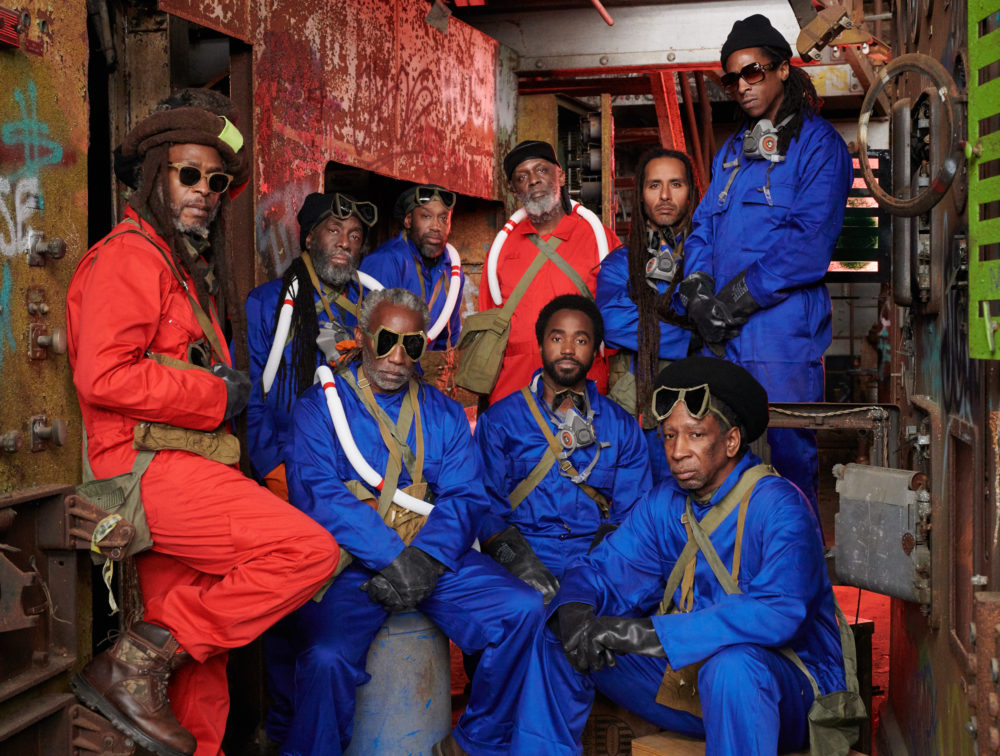
I think this album will do well. It seems very strong to me. Let's talk about some of the songs, starting with the first one, "Rise”—an uplifting opener, as a song called "Rise" should be.
[Chuckles] You know, Banning, I have got some close associates that helped me see that is the direction I should be going in. Ziggy Marley came out wit a song called “Rebellion Rises.” We were still in there tidying up our album, and our song was written long before “Rebellion Rises.” But now Ziggy Marley's track was out there and I became apprehensive about putting that track on the album.
But then I said, "Hang on a minute," and I started to listen. The subject matters are completely different. Because we interleaved with a lot of other subjects; we’ve given all kinds of reasons why you should rise, as opposed to just saying, "Rebellion rising, rebellion rising." There's more to the Steel Pulse story than repetitive words. So I felt confident after his version that "Rise" needed to open the album anyway. There are so many songs that could open the album, but I felt that one should. I got sidetracked when I heard that he had a song out with the word "rise" in it as well. And my friend said, "Fear not. It’s nothing like yours." So we put it out and I have no regrets.
Thomas Mapfumo has a song called "Rise Up." He wrote that late in the Mugabe years. He was basically telling people to get on their feet and fight. It was a very direct message.
So you'll find, Banning, that there's going to be lots of songs out there that might have similar titles, but when you start persevering, you see that the actual content has a different spin to it. Because in "Rise," we talk about the Windrush generation. Are you familiar with the Windrush generation?
I don't think so.
All right. Windrush. Let me explain that to you. After World War II, there was an actual ship called the Windrush. It was once a warship, but because the war was over, it served no other purpose, and the government decided to use the ship to transport those that were colonized in the Caribbean to the United Kingdom to build it up. So the ship went out to the Caribbean and gathered all these people for employment in the United Kingdom. Britain was virtually decimated by all the bombs that were scattered all over the bloody place. So now, many years have ticked over. You come to find out that Britain came with a skullduggery situation where they wanted to send those that came on the ship, and their offspring, the children, back to the Caribbean because they had no proof that they came into the country legally.
It was a big uproar in the United Kingdom where they were deporting kids that had lived there all their lives. And the story goes that they could not prove that they had passports. The thing was that all they were at the time were names written on the passports of their parents, and those passports, after 50 or 60 years, had expired a long time ago. Now who's going to be keeping a passport 60 years after it expired? Especially when the parents went on to be British citizens, or went back and left their children in the United Kingdom. So their kids were there with their names on their parents’ passports, and they had never seen the passport and their photographs weren't there, and they had to prove that they didn't come into the country illegally.
So I mention the Windrush generation within that track. I also mention redlining. You won't find reggae artists from out of Jamaica choosing these as subject matters. It's not their experience. And this is what makes us at different than the rest. Not that it's better, but it's different.
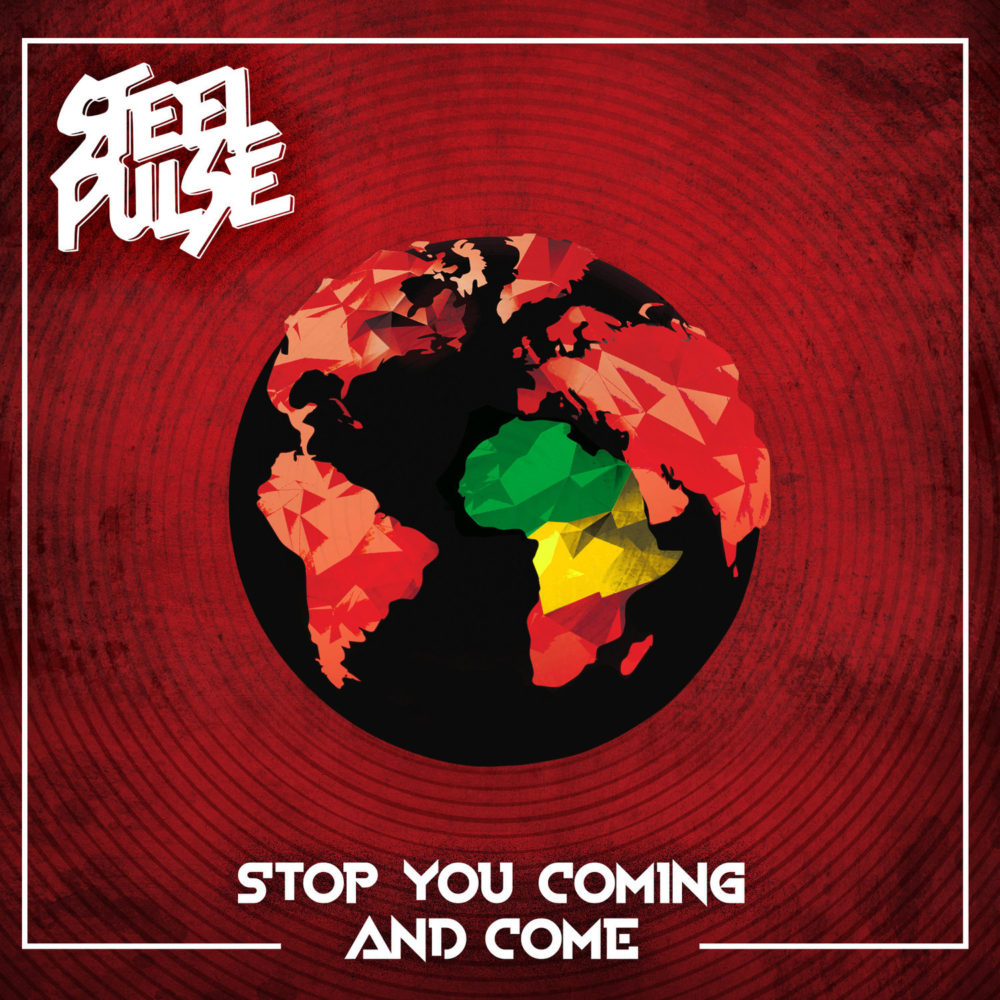
Of course. It is of your place and your experience. What about “Stop You Coming and Come”?
“Stop You Coming and Come.” I got sidetracked en route to a show in Costa Rica only to find out that the promoter got beaten up and had to cancel the show. I don't know what happened, but it left me with a week and a half of doing nothing. And a friend of mine, Dr. Dread, was in Ethiopia at the time and he called me out of the blue. I was on one of those islands off the African continent. He says, "Where you are?” I was in Mauritius or Reunion, one of those African islands. He says, "Man, I'm in Ethiopia." And I said, "You know what? I've been saying I would be coming to this country for quite some time," and I decided to buy a plane ticket.
I went out and spent eight wonderful days penetrating the country. Hitting key cities like Shashamane. As you know it's a city that's been overlaid with the Rastafarian experience, and Lalibela in the north of the country, which is known for the churches. It was phenomenal. It's one of the wonders of the world as far as I'm concerned. Obviously, Addis Ababa. I wanted to tour the towns where Haile Selassie had his homes. And going to Shashamane, I bumped into a dreadlocks individual, well a couple of individuals that came from my hometown, Handsworth. They were actually living out there. And seeing me there, they were talking with joy, and also with sorrow. Happy to see me, and sorry that it took us so long to get there.
I was guilt-ridden for that five-hour journey driving back from Shashamane to Addis. So when I entered the hotel, I decided to pen this song, a song about coming to Ethiopia, repatriation and the whole thing.
I've heard of that Rasta community. I would love to visit it.
It's several miles away from the capital. What was interesting was that Haile Selassie left it, or gave it to the black diaspora outside of Ethiopia to take control of. And it was very much a strategic point, because once the roads were built in Ethiopia, it was like a main channel for all the other towns. It's almost like Paris: Paris is not quite like any other city in the world. It's unique in that everything you do in France, you’ve gotta be routed through Paris. That's how the French have set themselves up. So for Haile Selassie to have had that insight about Shashamane, and now it's developing where there are a lot of main roads that are leading from that particular district to key cities that were underdeveloped. So that's the vision that Haile Selassie had. And he probably thought that those from the diaspora would have a lot more finance generated from living in the Western world, and would come back and make a difference. So with that experience, I decided to pen that song.
How long ago was that?
It was only two years ago. Exactly two years ago. Here's another thing we can mention on the album. Because one of the things that touches me deeply when I think of Africa, we see Africa being taken advantage of. I'm trying to channel my views into a song called "Cry Cry Blood,” and another one more particularly, "No Satan Side." Today, there is a different type of race and nation penetrating Africa, and we know Africa has always been taken advantage of for several centuries now, with slavery, colonialism, and now the second format, the second entity of slavery with the Chinese.
Look at Ethiopia, Addis Ababa. I've never seen so many buildings that have been developed in such a short space of time in the capital itself. Nowhere in the world have I seen so many buildings being developed. And I was originally taking pride that it’s Ethiopians who are doing all this. I come to find out that the Chinese have got their hand on the blueprints and everything else you can think of. And it's every single country, not only in Africa, in the Caribbean too. So it's like “No Satan Side” was penned for that reason, to stop the rape of Africa. Let's face it. China has a population of 1.3 billion people, and they need to disperse the indigenous people of China and other parts of the world so they will continue as a superpower.
That's huge. Makes me think of another Mapfumo song where he talks about credit, telling people, "The Chinese are not just giving you all that stuff for free."
No. And they are not. Right now, Jamaica has already parted with well over 12,000 acres of prime real estate and prime land. All that. The minerals have been taken advantage of in Africa. The land has been given away. You come to find out there's loads of minerals under that land. Roads have been dug up and the soil taken away for testing. So while you are under the impression that roads are being built for the the people, it also has a double meaning, and the other meaning is about taking soil away to see what kind of minerals are there to exploit at a later date.
When I look at the whole scheme of things, what's happening here is you got America's spending many, many years with Russia in the Cold War. Cuba. Castro. Khrushchev. All that thing was going on, and right now there's Jamaica that has land owned by Chinese, and there's a third world country that's going to be a superpower right on America's ass again. Pardon my Spanish. And I’m saying, "Yo! I see all these things happening and it seems like the world is falling asleep.” Not that I'm against China per se. It could have been any other country. It could be Russia. My thing is that it's about time Africa becomes self empowered. That's the sad part about it. And when you mentioned Thomas Mapfumo donating his legacy in the aftermath of Mugabe-ism. Well, thank God we’re opening our eyes, but I sincerely hope it's not too late. The way things are panning out right now, I am expecting the worst. [Laughs]
There is now a new generation of Africans who are very keen to leave behind the hang-ups of their parents, to be more progressive and get rid of corrupt leaders, to be smart and effective business people. On the one hand, it's encouraging to see them so determined to make things right in the future, but then you look at how it's happening with all this Chinese money, and I hear what you're saying. It might not end well.
I can only imagine it ending on a sour note, because the African in the diaspora has not moved forward along with the continent for all kinds of reasons. Because if you're at a disadvantage, one of the key things when it comes to the development of Africa and the diaspora is education. If there's no money there to educate you, how are you going to progress to make the right moves for the betterment of your country? By the time you have done that, as time rolls by, with the way things increase in equity, you are put at a disadvantage. What would've been 1,000 pounds for $1,000 has now become $1 million.
So are you trying to work with the program, but it's probably going to be in vain because that $1,000 in 1,000 pounds was hard to get in the first place. This is where we're at. Songs like "Cry Cry Blood,” which we actually did a video for in Jamaica, and "No Satan Side,” I am hoping that they will wake the diaspora up. Not only that, wake mankind up, for mankind to realize that as a human race, were not going to go forward if we don't start being fair to the other races that have been a contribution along with the history of mankind.
You know, people who do get educated in foreign countries often don't go back. And that's a common message you hear in African music. I think you even refer to that on this album, that idea that Africans who go abroad to learn and get skills should go back and help build their countries.
I often think about that. But let's put Africa aside and think about Jamaica. The situation in Jamaica is running parallel to what's happening in Africa. A child manages to get his education and decides to leave Jamaica. And as time rolls by, he would like to know that he could back and buy a piece of land and be part of the infrastructure. But he can no longer do so because the whole country is owned by someone else. What is the point of them returning? Return to do what? Return to a place where they can never own anything? This is where we’re at. The intentions are there to return and make a difference, but when you're not given any opportunity because of corrupt leaders, and leaders don't have any scruples and are making bad maneuvers not in the interest of your country, what makes you want to go back?
I guess it would have to be some abstract sense of loyalty. A willingness to throw yourself in there and try to make it better. But maybe that's a romantic fantasy. I don't know. But I do know that a lot of African singers sing about this these days.
True. Africa is a vast place, but I'm talking about Jamaica that's not so vast. See what I'm saying? Africa is not exactly a touristic kind of a country. Outside of a few spots. Sure, there's a few tours going to Gambia. But I've been to places like Ethiopia and Nigeria. And I don't exactly see a whole ton of Europeans making their way down there. So Jamaica will be exploited to an extent, and as Africa tries to expand itself knowing that it still has to rely on European aid, you're going to find that it's being disenfranchised and taken advantage of economically.
Let me ask about one more song here, the last one. "Nations of the World." It seems like you wanted to end on a big concept.
“Nations of the World.” If you notice there's a couple of parts where I mention Haile Selassie in there. It's really about nations of the world reasoning. To fight for equal rights, all the things that it takes for the nations to respect each other. We tried to distribute that song a couple of years ago as an idea at the time. It was when the Olympics were out in Brazil. We wanted for it to be at least played on radio and be advertising the Olympics. But it never turned out that way. This is one of those songs where it's all about peace and prosperity. It's all about being a philanthropist, all about hope. I would like to know that we've got songs like that, as well as the one that we wrote that kind of adapts that Steve Winwood track, where there are elements of hope and opportunities still there for those who are concerned about making a difference in the world.
I kept visualizing this song as a video. I remember when I went to the United Nations and did a U.N. performance about five years ago. I can't remember what we were commemorating, but we were hoping that we would be able to be part of the Organization of African Unity, which was in its 50th anniversary at the time. I remember sitting at the desk where you could see the names of the countries. And I always wished that if we were ever to do a video of that song, that we could have me singing and the band performing seated at the various seats of the U.N. Performing with those countries.
That would be great.
That's how I visualized it. Please don't steal my idea. But even if you do, when Steel Pulse comes, we will have a different spin to it. So it's O.K.
Just to end, tell me about the band. How much has the personnel changed?
It hasn't changed for some time. There are just two of us from the original originals. Myself and Selwyn Brown. And although Grizzly was not in the band, he was often spoken of. You know Grizzly passed away January last year. We actually hosted an event for him inviting loads of drummers in different walks of life to perform a particular event in honor of Grizzly. We also raised interest with the prime minister who was down there in Nevis. That's the country of his birth, where they named a district, and a particular street in the honor of Grizzly Nesbitt. So the original band members left from the very beginning when the first chord was struck for the Handsworth Revolution album, it’s just myself and Selwyn Brown. But we have got guys like Sidney Mills who's been with us for a good part of 30 years, and drummer C-Sharp (Wayne Clarke) out of Jamaica has been with us for a good 11 years I would say. And Amlak Tafari, the bass player. And we've had some newcomers in. We’re still Steel Pulse. We'll always survive because it isn't a case of six or seven guys it's has to be in order to play the music. There's a concept that was born, so no matter who… It's almost like is going on with the Grateful Dead right now. The concept of Jerry Garcia is still there.
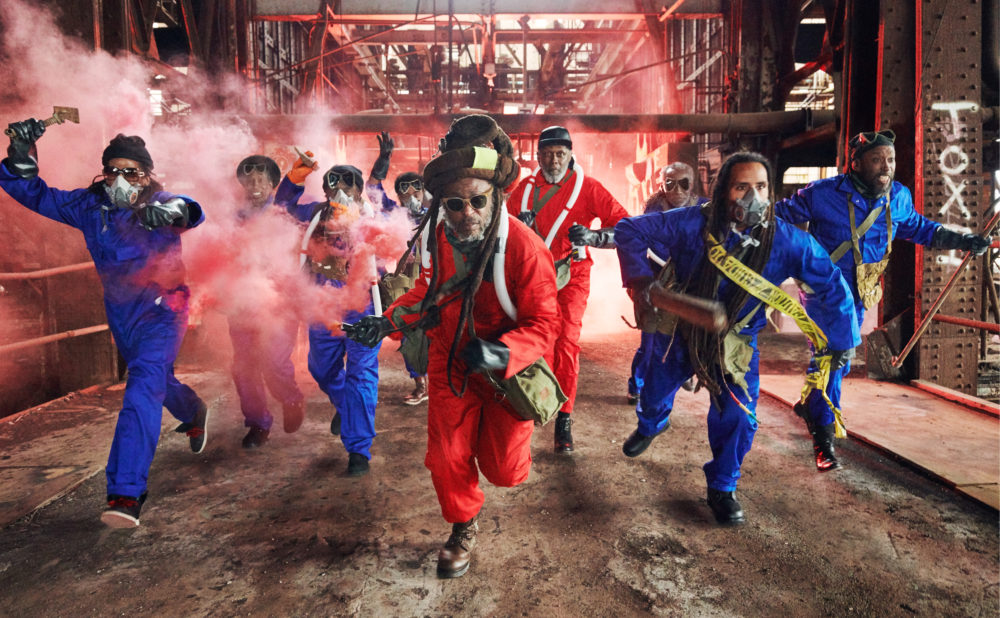
The man is gone, but the sound remains.
Right. And there’s someone making sure the sound is still there, because it's so easy to stray from that sound and make it something else.
Your son raps on a couple of these songs, doesn't he?
Yes. There are two songs he raps on right now. Mr Baruch, I call him.
He's on "World Gone Mad." He's also on "Higher Love, Rasta Love."
How old is he?
He doesn't look it, but he's 36. He's been rapping for some time now, but his kind of rapping is like nothing like what we do. What I find extraordinary about him is that he's a lot more malleable than I am when it comes to lyrical subject matters. My forte is not writing love songs. I could write political songs all day long, whereas his forte is not writing political songs, but he can do it at the drop of a hat. So this is where I kind of take note of his ability. He puts what he normally does aside—all this gangster rap and that kind of stuff, talking about drugs and how high he likes to get—and all of a sudden, he's being ordered to wear a different hat and offer encouraging lyrics, not throwaway lines.
Because one thing I hate when it comes to lyric writing this with someone just writes throwaway lines. There's Pam, and there’s spam, and there’s Pam. And I'm saying, they put all these words together and make a story with lyrics like that, but they don't move me. And it goes on all the time in everyday music, as you know. And for him to put his lyrics and his spin on the lyrics, and they're not throwaway lines, impressed me, because it's not what he normally does. And for him to do that made me go, "Yeah? Damn, did you do that?"
That's great. Thanks so much David. Great to meet you. You will be playing here sometime soon, right?
Yeah there's a schedule. Don't ask me where I'm at. I can't tell you where I’m at from day to day up, man. You gotta search. I didn't even know I was coming here to speak for you. “Oh, you have another interview.” Bam. I thought that was it for the day.
Sorry to make you work so hard.
No, we don't mind. We know, because we’re coming from the old school. We know what it takes to make the music happen. And if it means starting again, we're prepared to start again, because we have seen the Masters do it. We've seen all the guys that we worshiped and honored and adored and became our mentors in the music back in the day. We have seen how hard they worked to keep the music, and because we have lived that experience, it’s easy for us to follow suit. So we know what it takes to make it happen, and we want to make it happen. There are times where the spirit is willing, and thank God, the flesh is not weak.
Thanks so much David. What a pleasure.








